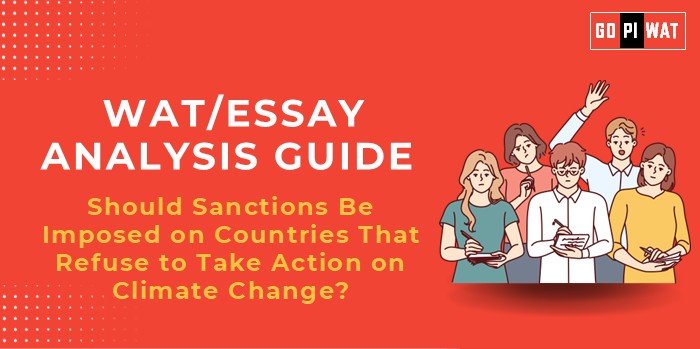📋 Written Ability Test (WAT)/Essay Analysis Guide
🌍 Topic: Should Sanctions Be Imposed on Countries That Refuse to Take Action on Climate Change?
📖 Understanding the Topic’s Importance
💡 Climate inaction threatens global sustainability and the economic stability of nations. B-schools increasingly value understanding environmental policies due to their impact on industries, trade, and governance.
🕒 Effective Planning and Writing
- ⏱️ Time Allocation:
- Planning: 5 minutes
- Writing: 20 minutes
- Review: 5 minutes
- 📚 Structure:
- Introduction: 60–70 words
- Body: 350–375 words
- Conclusion: 60–70 words
✍️ Introduction Techniques
- ⚖️ Contrast Approach:
“While renewable energy adoption grows, countries like the US and China still account for nearly 40% of global emissions. Should sanctions enforce responsibility?”
- 💡 Solution-Based Approach:
“Sanctions could compel climate action, but they must balance equity with enforcement to avoid hindering global cooperation.”
📚 Structuring the Essay Body
- 🏆 Achievements:
- Highlight successes like Paris Agreement milestones that have spurred renewable energy transitions.
- Showcase examples of nations making strides in renewable energy adoption and emissions reduction.
- ⚠️ Challenges with Comparative Analysis:
- Explore fairness concerns, especially for developing nations like India and Brazil, whose emissions are tied to growth needs.
- Balance this with examples of strict EU policies, such as carbon pricing, that incentivize compliance.
- 🌏 Future Outlook:
- Emphasize the need for global solidarity in tackling climate change.
- Propose innovative solutions such as technology sharing and green financing mechanisms for vulnerable nations.
- Highlight scalable initiatives like carbon trading systems and international renewable energy funds.
🔑 Concluding Effectively
- ⚖️ Balanced Approach:
“While sanctions may drive compliance, they risk undermining unity unless paired with supportive frameworks.”
- 🌍 Global Example-Based:
“From the EU’s carbon tax to China’s renewable push, collaborative mechanisms offer pathways beyond sanctions.”
🌱 Recommendations for Sustainable Progress
- 📜 Develop international legal frameworks ensuring fair accountability for climate actions.
- 📈 Strengthen green financing mechanisms to support vulnerable nations transitioning to cleaner energy.
- 🤝 Promote technology-sharing initiatives to enable scalable climate solutions across the globe.
📄 Sample Short Essays
- ⚖️ Balanced Perspective:
“Sanctions can drive climate action but risk inequity. Global cooperation and financial aid are crucial for sustainable progress.”
- 💡 Solution-Oriented:
“Pairing sanctions with incentives like green funds can ensure compliance while fostering equitable transitions.”
- 🌏 Global Comparison:
“Countries like the EU lead with carbon pricing, setting examples for sanctions as last-resort measures in global climate policies.”


